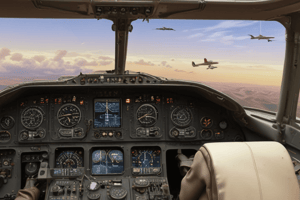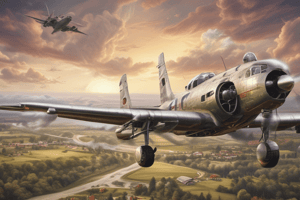Podcast
Questions and Answers
Quelle est la première condition à remplir pour transférer le contrôle d'un aéronef entre deux tours de contrôle ou agences de contrôle de la circulation aérienne (ATC) adjacentes?
Quelle est la première condition à remplir pour transférer le contrôle d'un aéronef entre deux tours de contrôle ou agences de contrôle de la circulation aérienne (ATC) adjacentes?
- Une identification de l'aéronef est transférée au contrôleur acceptant
- Une surveillance radar primaire est utilisée
- Une information de vol à jour est fournie à la tour de contrôle acceptante avant le transfert (correct)
- Une séparation minimale entre les aéronefs transférés et les autres aéronefs contrôlés est convenu entre les agences de contrôle concernées
Flashcards are hidden until you start studying
Study Notes
- The transfer of control of an aircraft between two adjacent control towers or air traffic control (ATC) agencies can be carried out without prior coordination provided that the following conditions are met:
- Up-to-date flight information is provided to the accepting control tower before the transfer, including the discrete flight code assigned to the aircraft or, in the case of Mode S and ADS-B, the aircraft's identification.
- The covering surveillance system of the accepting control tower enables the controller to observe the aircraft in question on the display of situation before the transfer is carried out and to identify it as soon as it is received.
- If the accepting control tower does not occupy adjacent control towers, it is continuously able to radio voice contact directly to the controllers.
- The accepting controller is informed of any level, speed or guidance instructions given to the aircraft before the transfer and which modify the planned flight path from the transfer point.
- The minimum separation between aircraft being transferred and other controlled aircraft is agreed between the concerned control agencies beforehand.
- In cases where radar primary surveillance is used, another type of surveillance system may be employed but the provisions of § 8.7.4.2 do not apply. In such cases, the transfer of control of an aircraft between two adjacent control towers or air traffic control (ATC) agencies can be carried out in the following manner:
- The aircraft's identification is transferred to the accepting controller or it is established directly by the controller.
- If the accepting control tower does not occupy adjacent control towers, it is continuously able to radio voice contact directly to the controllers.
- The accepting controller is informed of any level, speed or guidance instructions given to the aircraft before the transfer and which modify the planned flight path from the transfer point.
- The minimum separation between aircraft being transferred and other controlled aircraft is agreed between the concerned control agencies beforehand.
- In cases where radar primary surveillance is used, another type of surveillance system may be employed but the provisions of § 8.7.4.2 do not apply. In such cases, the transfer of control of an aircraft between two adjacent control towers or air traffic control (ATC) agencies can be carried out in the following manner:
- The aircraft's identification is transferred to the accepting controller or it is established directly by the controller.
- The accepting controller is informed of any level, speed or guidance instructions given to the aircraft before the transfer and which modify the planned flight path from the transfer point.
- The accepting controller is continuously able to radio voice contact directly to the controllers.
- The aircraft is transferred to the accepting controller upon receipt of an initial call.
Studying That Suits You
Use AI to generate personalized quizzes and flashcards to suit your learning preferences.




